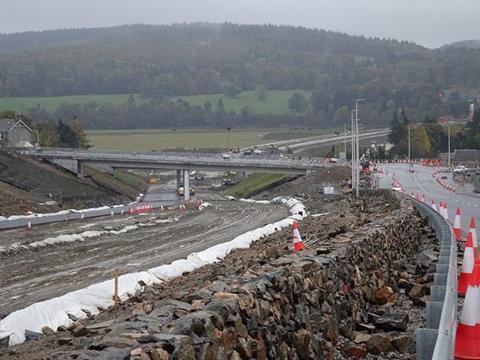Pair set to receive £32m each in dispute with Transport Scotland
Balfour Beatty and Galliford Try have said they are close to striking a settlement in a long-running dispute over what the pair claim they are owed on their scheme to build a dual carriageway in Scotland.
The 58km-long Aberdeen Western Peripheral Route (pictured) was mired in a series of problems caused by issues such as bad weather and the cost of carrying out utility diversions. It was finally fully opened in February – more than a year late.

In August, Balfour Beatty chief executive Leo Quinn told Building the joint venture, called Aberdeen Roads Limited, was due “hundreds of millions” from client Transport Scotland and added: “The job was sold for £530m but has cost over £1bn to deliver.” He said Aberdeen Roads, which had included bust contractor Carillion, had been forced to shoulder around £500m in extra costs.
But in an update earlier today (Monday), Balfour Beatty said it was “in advanced discussions with the client” regarding a £32m settlement it would receive.
It added: “The settlement [would have] no material change to the group’s balance sheet position. Any settlement would remain subject to usual consents and approvals of all interested stakeholders.”
Galliford Try said it was also expecting a cash payment of £32m, adding that it would incur a write-off of £52m on the job.
In a statement, the firm, which is set to become a construction-only business once the sale of its housing and partnerships businesses to Bovis Homes formally completes next month, added: “The settlement brings to a conclusion a complex and challenging project, averting a lengthy and costly litigation process. The settlement also removes a significant distraction and uncertainty, allowing the construction business to focus on its core business.”
Balfour Beatty signed the deal in December 2014 – just a few weeks before then new chief executive Leo Quinn arrived at the firm.
Both Quinn and Bill Hocking, Galliford Try’s construction boss who will be the firm’s new chief executive when the Bovis deal is wrapped up, have previously said they would not have signed up to the job.
The scheme has caused huge financial damage to the firms involved with Carillion going bust last year, in part blaming problems on the road for its demise, while the costs of completing it and another problem job, the Queensferry Crossing, saw Galliford Try launch a rights issue last March to raise close to £160m.
In its statement today, Galliford said the Aberdeen road and another historical contract, thought to be the Queensferry Crossing, meant the firm will report an exceptional write-off of around £61m in its 2019 results.



























No comments yet